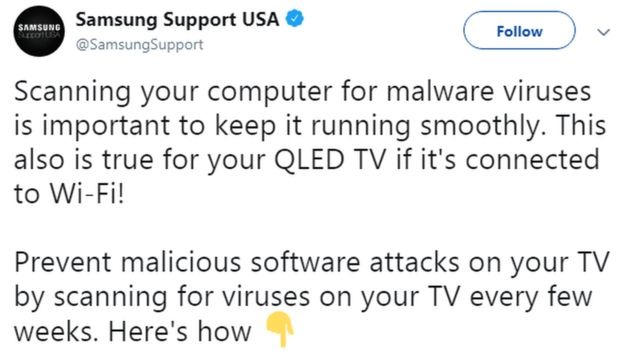Samsung TV Antivirus Advice Leads To IoT Security Confusion
Add your smart TV to the list of things you need to run antivirus on, with Samsung surprising – and worrying – some of its owners with the advice that they should've been scanning their sets for malware. The unexpected guidance came courtesy of Samsung's support account on Twitter, which warned that WiFi-connected TVs should be regularly checked for viruses and other potentially damaging software.
"Scanning your computer for malware viruses is important to keep it running smoothly," the tweet from the @SamsungSupport account read. "This also is true for your QLED TV if it's connected to Wi-Fi!"
"Prevent malicious software attacks on your TV by scanning for viruses on your TV every few weeks," the account advised. It also included a video of how to use a virus scanning tool that most Samsung QLED smart TV owners probably don't even know exists. It's buried under several levels of menu structure, under the "Smart Security" heading.
Samsung has since deleted the tweet, and the attached video. There's a version of the clip on YouTube still – which you can see above – however. It didn't move fast enough to avoid a legion of Twitter users replying either with criticism, skepticism, or just plain comedy to the security advice, though.
The most common comment is most likely surprise that this is an issue for smart TVs at all. While network-connected entertainment devices have been growing in number over the past few years, complete with integrated apps for streaming services like YouTube and Netflix, along with other features, most owners likely assume that they're not subject to the same malware and virus possibilities as a traditional computer.

All the same, the Internet of Things has for some time now been flagged as the next potential big war zone in digital security. For a start, that growing prevalence – with some homes having at least one connected gadget, whether that be a TV, smart speaker, or something else, in just about every room – makes for rich pickings in hackers can break into your network. Moreover, device-makers in general haven't always been as cautious and conscientious with their security as they should have been.
IoT gadgets shipping with default passwords on admin accounts, barely-hidden backdoor network access, and outdated firmware aren't hard to find, though there's no indication that Samsung is responding to a known flaw or exploit for its smart TVs. All the same, as interconnectivity spreads, all it takes is for one poorly-secured device to give a point of entry, and everything else could be compromised in turn.
A cautious user, therefore, may well decide that it's more trouble than its worth to have a TV that's online. Right now there are no reported cases of Samsung TVs having been infected by malware, and this looks to be a case of poorly thought-through customer support more than anything. "The video was posted for customer's education and to have it as a troubleshooting step," the account told one concerned owner. Still, it's a good reminder that you should think before you trust just anything with your network credentials.
